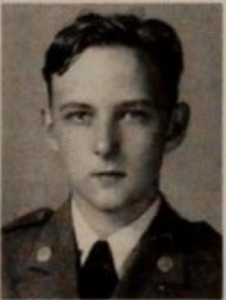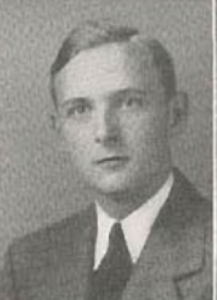Scroll of Honor – Francis Stafford Barnes, Jr.
Son of Two Institutions
In the spring of 1944, as Europe was holding its breath in anticipation of the long-awaited Allied Invasion, an invasion of smaller scale was taking shape in the southwest Pacific. General Douglas MacArthur, seeking to make good on his pledge to return to the Philippines, had his eyes on Biak Island. Biak dominated the entrance to Geelvink Bay at the western end of New Guinea and was some 850 miles north-northeast of Darwin, Australia. The island was garrisoned by 11,000 Japanese troops under the command of Colonel Kuzume Naoyuki.
an invasion of smaller scale was taking shape in the southwest Pacific. General Douglas MacArthur, seeking to make good on his pledge to return to the Philippines, had his eyes on Biak Island. Biak dominated the entrance to Geelvink Bay at the western end of New Guinea and was some 850 miles north-northeast of Darwin, Australia. The island was garrisoned by 11,000 Japanese troops under the command of Colonel Kuzume Naoyuki.
New Guinea had been in the news since shortly after Pearl Harbor. In January 1942, the Japanese had attacked and captured Australian-administered territory in eastern New Guinea. In March, the Japanese overran the western portion of the island which had been part of the Netherlands East Indies. By the time Frank Barnes, Jr. graduated with the Class of 1942, he likely would have been familiar with this jungle island on the other side of the world. Before he completed his Army training, US forces would be locked in a death struggle with Japanese defenders in eastern New Guinea.
Francis Stafford Barnes, Jr. of Greenville enrolled at Clemson College in 1938 to study architecture. He attended Clemson only for his freshman year, then transferred to the University of South Carolina. At USC, he excelled academically, graduating as a member of Phi Beta Kappa.
With the country at war, Frank Barnes headed to Fort Benning, Georgia for infantry officer training.  He was next assigned to Camp Blanding, Florida and then Camp Roberts, California. In late 1943, he shipped overseas. By the spring of 1944, Barnes was assigned to K Company of the 162nd Infantry Regiment, 41st Infantry Division.
He was next assigned to Camp Blanding, Florida and then Camp Roberts, California. In late 1943, he shipped overseas. By the spring of 1944, Barnes was assigned to K Company of the 162nd Infantry Regiment, 41st Infantry Division.
D-Day for the Biak invasion was May 27, 1944. At 0900, American forces began landing on the island. A tank battle developed between Japanese Ha Go Type 95 machines with their 37 mm canons and US Sherman tanks mounting a larger 75 mm gun. Following the tanks, infantrymen of K Company targeted their Japanese counterparts. During the battle, K Company was forced at one point to yield ground it had already fought over. K Company soldier Charles Brockman recalled that a daring six-man patrol led by Tech Sergeant Rex Smith made its way some 200 yards back into ground the company had given up during the attack. Smith and his men recovered weapons, equipment and the body of Second Lieutenant Barnes.
Brockman remembered that K Company “probably had our longest casualty list of World War II” that day. Seven members of the company were killed and twenty-one were wounded.
Second Lieutenant Francis Stafford Barnes, Jr. was posthumously awarded the Purple Heart. He was survived by his parents, Mr. and Mrs. Francis S. Barnes of Greenville.
Frank Barnes was an alumnus of both Clemson and Carolina and an American hero. He is poignant example of the ties that bind us together.
For more information about Francis Stafford Barnes, Jr. see:
For additional information about Clemson’s Scroll of Honor, visit:
